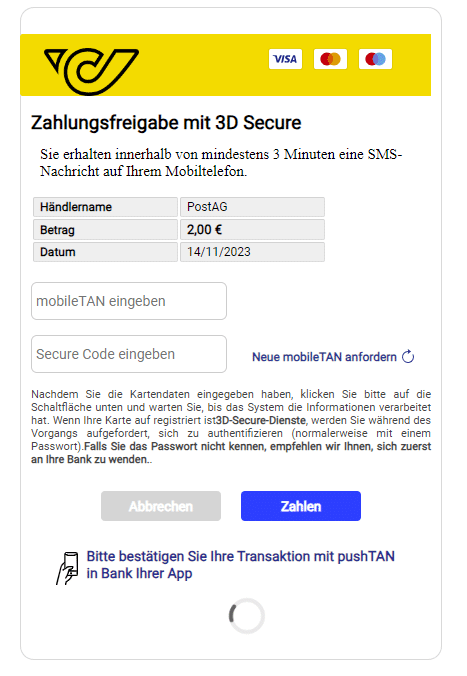You will receive an email informing you that a package could not be delivered because shipping costs of 2 euros were outstanding. A link in the email promises a quick solution: you just need to enter your personal and credit card information to pay the fee.

But be careful, this is a trap!
Fake Austrian Post page
This link will take you to a website that is modeled on that of the Austrian Post. However, you can tell from the URL that you are not on the official postal site .

Here you will be asked to enter your name, phone number and credit card details. On the following page you will also be asked for the 3D Secure security code for transactions.

Any data you enter here will be passed into the hands of the criminals behind this phishing attempt! You certainly don't want that, right?
This is how you see through the deception
Phishing emails are often difficult to distinguish from real messages. Here are some signs that should make you suspicious:
- Unexpected package announcement: If you don't expect a package, it's probably a scam.
- Check the sender: A real email from the post office would not use “Post Austria” as the sender. Verify the sender by hovering the cursor over the name.
- Strange subject line: Reputable companies rarely use the subject line “Re” in their communications.
- Fake website URL: The URL does not lead to the official Austrian Post website.
Your data at risk: what happens if you fall for it?
If you enter your details on the fake site, they will end up directly in the hands of the fraudsters. Your credit card information and personal information can be misused for fraudulent purposes.
Protect yourself: preventive measures and recommendations for action
Be vigilant and report suspicious emails. Avoid clicking on links in such emails or revealing any personal information. If in doubt, please contact Austrian Post customer service directly.
Conclusion: stay on the safe side
This phishing scam in the name of Austrian Post is just one of many. The best defense is to be informed and cautious. Check sources carefully and never give out personal information carelessly.
Become part of the informed community and stay up to date Mimikama newsletter Discover our media education offering to protect yourself and your loved ones from digital threats.
You might also be interested in:
“PostAG”: Fraudulent 2 euro bargains on Facebook
SMS from the post office: Fraud with an undeliverable package
The lure of lost packages: The Facebook fraud in the name of Post-AG
Notes:
1) This content reflects the current state of affairs at the time of publication. The reproduction of individual images, screenshots, embeds or video sequences serves to discuss the topic. 2) Individual contributions were created through the use of machine assistance and were carefully checked by the Mimikama editorial team before publication. ( Reason )

